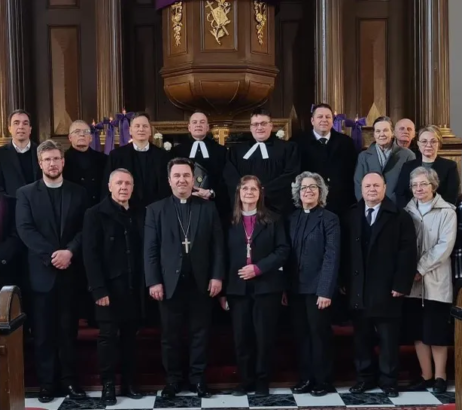Being part of a global communion of Lutheran churches is a wonderful thing.
Last September I attended the final meeting of the first round of the Lutheran World Federation International Dialogue Commission with the Pentecostals, as the North American representative. That same month, I was invited to make presentations at the Retreat for Newly Elected Leaders (Bishops and Presidents) of member churches in the LWF, held in Wittenberg, Germany. There I met the new bishop of the Slovak Evangelical Church of the Augsburg Confession in Serbia, Bishop Jaroslav Jarvornik, who invited me to come to Serbia to speak to his pastors this spring. In March, I accompanied Bishop Wilma Kucharek, of the ELCA’s Slovak Zion Synod, and her son, the Rev. Dr. Thomas Drobena, who regularly visit Slovak churches in central and eastern Europe to strengthen these international partnerships as part of the Synod’s mission. All three of us spoke at the annual spring pastors’ gathering/continuing education event. My assigned topic was the Lutheran-Pentecostal Dialogue. The bishop and pastors were very interested because many had encountered Oneness (non-Trinitarian) Pentecostals who baptized “in Jesus’ name” who they said were proselytizing their inactive members.
Several of the pastors I met spoke excellent English, which I discovered was one concrete result of the Slovak Zion Synod’s Student Immersion Program, one of their featured missions in central and eastern Europe. Through this program the Synod sponsors seminary students from the Slavic world to come to the U.S. for a summer, hosted by congregations of the Slovak Zion Synod and other ELCA synods. Nearly 150 students have participated in this program since its inception in 1991. Any ELCA congregation can apply to host a student (click on the hyperlink to learn more).
We were hosted all around Serbia—going from Belgrade to Stara Pazova to Padina to Novi Sad to Hložany and back to Belgrade – visiting congregations and church leaders and learning about the challenges they faced as minorities in two aspects: as Slovaks among Serbs (settling in the area nearly 300 years ago), and as Lutherans among the Serbian Orthodox (who make up almost 85% of the population). A growing challenge for this small church in former Yugoslavia is maintaining their Slovak identity in a majority Serbian environment, which they do through Slovak language schools and church life, and a close connection to their larger counterpart and church namesake in the Republic of Slovakia.
I will admit I did not know what to expect when I was invited to visit Serbia, almost twenty-five years after the breakup of the Soviet Union and the Yugoslav wars. The pastors and lay leaders I met have given me a “face” to this part of the world, showing me a church that is resilient, grounded in the faith, proud of their Lutheran heritage, and dedicated to their youth. And I am remiss if I don’t mention the wonderful hospitality—especially the food! (I have not eaten a piece of poppy seed bread that delicious since before my grandmother died more than 30 years ago).
A few weeks ago, as part of worship at Trinity, we sang the litany, “For the Healing of the Nations,” with a map of the world on the floor of Schenk chapel. People were invited to light a tea candle and place it on a country on the map that was meaningful to them. As I placed a candle on Serbia, I smiled as I thought of and prayed for my siblings in Christ there.
The Rev. Cheryl M. Peterson, Ph.D.
Professor of Systematic Theology
Trinity Endowed Chair in Mission and Ministry
Associate Dean for Academics
Trinity Lutheran Seminary forms leaders for Christ’s church at work in the world.



